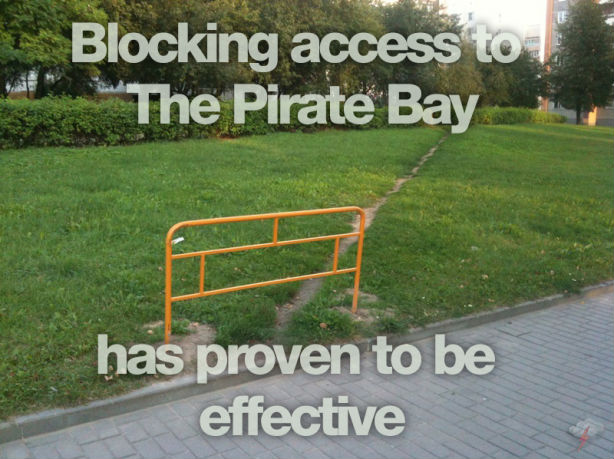Pirate Bay Block Doesn’t Boost Sales, Research Shows
jeudi 4 juin 2015 à 19:11 The Pirate Bay is the most censored website on the Internet. Countries all around the world have ordered Internet providers to block subscriber access to the torrent site, with Russia being the latest addition.
The Pirate Bay is the most censored website on the Internet. Countries all around the world have ordered Internet providers to block subscriber access to the torrent site, with Russia being the latest addition.
The idea behind these blockades is that they will help to decrease online piracy. However, a new study published by Carnegie Mellon University and Wellesley College researchers, suggests that blocking one site isn’t very effective.
The researchers used data collected by an anonymous Internet consumer panel tracking company to compare the browsing habits of UK citizens, both before and after The Pirate Bay was blocked by major ISPs in 2012.
After comparing the results to a control group and ruling out various other variables, the researchers conclude that there is no significant effect on legal consumption.
Instead, Pirate Bay users chose to circumvent the measures by using VPNs, proxies, or switching to other pirate sites.
“Our results show that blocking The Pirate Bay had little impact on consumption through legal channels — instead, consumers seemed to turn to other piracy sites, Pirate Bay ‘mirror’ sites, or Virtual Private Networks that allowed them to circumvent the block.”
While the above findings support the many opponents of website blocking, it’s only part of the story. The researchers also analysed data after a subsequent blockade that covered more than a dozen large pirate sites at once.
The results here were quite different, with a significant uptick in the number of visits (of ‘pirates’) to legal movie services such as Netflix.
“…blocking 19 different major piracy sites caused users of those sites to increase their usage of paid legal streaming sites such as Netflix by 12% on average,” the researchers write.
This effect was most pronounced for people who used the pirate sites most frequently. According to the researchers this makes sense as they were most affected by the blockade.
“The lightest users of the blocked sites increased their clicks on paid streaming sites by 3.5% while the heaviest users of the blocked sites increased their paid streaming clicks by 23.6%, strengthening the causal interpretation of the results.”
Overall the results show that blocking The Pirate Bay in isolation is futile. For website blockades to have a serious impact they should be directed at a broad selection of pirate sites, making it harder for people to find illegal alternatives.
“Our results suggest that website blocking requires persistent blocking of a number of piracy sites in order to effectively migrate pirates to legal channels,” the researchers note.
Perhaps just as importantly, the researchers add that copyright holders should also make legal content more attractive in order to convert pirates into paying customers.
It has to be noted that the research was carried out as part of Carnegie Mellon University’s Initiative for Digital Entertainment Analytics (IDEA), which received a generous donation from the MPAA. However, the researchers suggest that their work is carried out independently.
The results may not help efforts to demand isolated Pirate Bay blockades, which is common in most countries. However, they can be used as ammunition to demand wider website blockades, which is arguably even better from a copyright holder perspective.

Source: TorrentFreak, for the latest info on copyright, file-sharing, torrent sites and anonymous VPN services.
 While the video entertainment business needs to do better, Netflix is definitely going some way to filling the online movie and TV show streaming void. Nevertheless, even when consumers put their hands in their pockets for the service, elements of the industry still find cause to complain.
While the video entertainment business needs to do better, Netflix is definitely going some way to filling the online movie and TV show streaming void. Nevertheless, even when consumers put their hands in their pockets for the service, elements of the industry still find cause to complain.

 In the long-running case of the U.S. Government versus Kim Dotcom, almost every court decision achieved by one side is contested by the other. A big victory for the U.S. back in March 2015 is no exception.
In the long-running case of the U.S. Government versus Kim Dotcom, almost every court decision achieved by one side is contested by the other. A big victory for the U.S. back in March 2015 is no exception.